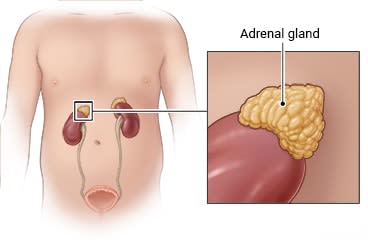
What is an adrenalectomy?
Adrenalectomy is surgery to remove all or part of one or both adrenal glands. The glands are above the kidneys. They make hormones that affect nearly every organ in the body. These hormones include adrenaline and cortisol. They do many things in the body. For example, they help control blood pressure. They help the body deal with stress. And they control the breakdown of fats and proteins in the liver.
This surgery may be done to remove a tumor that may or may not be cancer. It also may be done for people with Cushing's syndrome, a problem that causes too much cortisol in the body. It may be done to remove a tumor that makes too much adrenaline.
The surgery may be done through a single cut (incision). This is called open surgery. Or you may have laparoscopic surgery. To do this, the doctor puts a lighted tube, or scope, and other tools through several small cuts.
If you have laparoscopic surgery, you may be able to leave the hospital the next day. With open surgery, you may stay in the hospital for a few days or longer.
How do you prepare for surgery?
Surgery can be stressful. This information will help you understand what you can expect. And it will help you safely prepare for surgery.
 Preparing for surgery
Preparing for surgery
- Be sure you have someone to take you home. Anesthesia and pain medicine will make it unsafe for you to drive or get home on your own.
- Understand exactly what surgery is planned, along with the risks, benefits, and other options.
- Tell your doctor ALL the medicines, vitamins, supplements, and herbal remedies you take. Some may increase the risk of problems during your surgery. Your doctor will tell you if you should stop taking any of them before the surgery and how soon to do it.
- If you take a medicine that prevents blood clots, your doctor may tell you to stop taking it before your surgery. Or your doctor may tell you to keep taking it. (These medicines include aspirin and other blood thinners.) Make sure that you understand exactly what your doctor wants you to do.
- Make sure your doctor and the hospital have a copy of your advance directive. If you don't have one, you may want to prepare one. It lets others know your health care wishes. It's a good thing to have before any type of surgery or procedure.
What happens on the day of surgery?
- Follow the instructions exactly about when to stop eating and drinking. If you don't, your surgery may be canceled. If your doctor told you to take your medicines on the day of surgery, take them with only a sip of water.
- Follow your doctor's instructions about when to bathe or shower before your surgery. Do not apply lotions, perfumes, deodorants, or nail polish.
- Do not shave the surgical site yourself.
- Take off all jewelry and piercings. And take out contact lenses, if you wear them.
 At the hospital or surgery center
At the hospital or surgery center
- Bring a picture ID.
- The area for surgery is often marked to make sure there are no errors.
- You will be kept comfortable and safe by your anesthesia provider. You will be asleep during the surgery.
When should you call your doctor?
- You have questions or concerns.
- You don't understand how to prepare for your surgery.
- You become ill before the surgery (such as fever, flu, or a cold).
- You need to reschedule or have changed your mind about having the surgery.
Where can you learn more?
Go to http://www.healthwise.net/patientEd
Enter A237 in the search box to learn more about "Adrenalectomy: Before Your Surgery".
Current as of: October 27, 2024
Author: Ignite Healthwise, LLC Staff
Clinical Review Board
All Ignite Healthwise, LLC education is reviewed by a team that includes physicians, nurses, advanced practitioners, registered dieticians, and other healthcare professionals.

